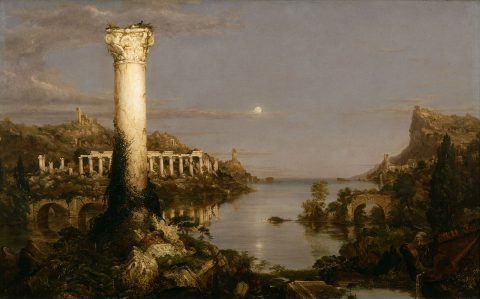In UnHerd, Alexander Poots wants pundits to stop comparing this or that country in the West to the latter stages of the Gibbonian decline of Rome:

“The Course of Empire – Desolation” by Thomas Cole, one of a series of five paintings created between 1833 and 1836.
Wikimedia Commons.
On both sides of the Atlantic, hysterical comparisons between the collapse of the Roman Empire and the senile polities of the modern West have become the journalistic norm. Every major problem facing our society — from climate change to Covid to inflation — has received the Gibbon treatment.
There are, of course, regional variations. The British, tied by geography to Europe’s fortunes, tend to favour the definitive fall of the Western empire in AD 476. The Americans, ever fearful of an over-mighty executive, linger on the collapse of senatorial authority in 49 BC. And it is also more than a journalistic trope, with the unacknowledged legislators of our world also playing the same game. Elon Musk recently suggested that today’s baby drought is analogous to the low birth rates of Julius Caesar’s dictatorship. Marc Andreessen has compared California to Rome circa AD 250. Joe Rogan, meanwhile, is beginning to suspect that all this gender business might have a worrying ancient precedent.
Such appeals to the past are only human. The fourth word in Virgil’s Aeneid is Troiam. This is the first fact that we learn about Aeneas: he is from Troy. Virgil does not even bother to tell us his hero’s name until the 92nd line. Doubtless, the poets of Ur and Hattusha had their own Troys. And perhaps the first men who placed one mud brick upon another sang of flooded valleys, choked caves and herds that no longer ran. But Rome has been our common loss since the early Middle Ages. As Virgil looked back to Priam, so we look back to Virgil. In 1951, it was perfectly natural for W. H. Auden to compare a dying Britain with a dead Rome: “Caesar’s double-bed is warm / As an unimportant clerk / Writes I DO NOT LIKE MY WORK / On a pink official form”
But journalists and billionaires do not work in a poetic register. They deal in facts and lucre. When they say that Britain or America is following imperium Romanum down the dusty track to oblivion, they seem to be speaking literally. This is not a mistake that Virgil would have made. It is all very well to evoke Rome as an elegiac warning. But if we believe that there are concrete lessons to learn from the Roman Empire’s decline and fall, then we will have to examine the mother of cities as she really was. The results are surprising.
In AD 384, 400 years after Virgil composed his Aeneid, Quintus Aurelius Symmachus had a bridge problem. Symmachus was Urban Prefect of Rome, a role of huge responsibility. By the fourth century, the city of Rome was no longer the imperial capital of the western empire; it had been replaced in 286 by Mediolanum (modern Milan), which was a good deal closer to the empire’s febrile northern borders. But Rome remained the nation’s hearthstone. Her good governance was of the highest priority. The Urban Prefect dispensed justice, organised games, fed the mob and looked after the material fabric of the city. It was not an enviable position. One man had to keep the vast, turbulent metropolis ticking over with the minimum of rioting. Symmachus was well aware of the touchiness of the Roman pleb. His own father had been burned out of his house and chased from the city after making a catty remark of the “let them eat cake” variety during the wine shortage of 375.
The bridge problem went like this. Around 382, the emperor Gratian ordered that a new bridge be built across the Tiber. It soon became clear that construction was taking too long and costing too much. Two years later, as the project neared completion, one span collapsed. Such waste of public funds could not be ignored, and so an inquiry was launched. A specialist diver was engaged to examine the structure; he discovered that the job had been bodged. The engineers responsible for the project, Cyriades and Auxentius, were summoned to account for their failure. Each blamed the other, before Auxentius, who had been caught backfilling sections of the bridge with bales of hay, fled the city — pockets doubtless jingling with public gold.
On the face of it, this sounds like a very late Roman story: a nation once famous for its engineering prowess could no longer build a bridge across the Tiber without everything going horribly wrong. But I’m not sure that’s true. Problems arise all the time, and in themselves tell us very little about a society. What matters is the response to those problems. And Symmachus’s dispatches to the imperial court make it clear that his response was considered and comprehensive. The bridge was completed in the end, and stood for over 1,000 years until its demolition in 1484. Now think of 21st-century London: remember what happened the last time we tried to build a bridge across the Thames?



